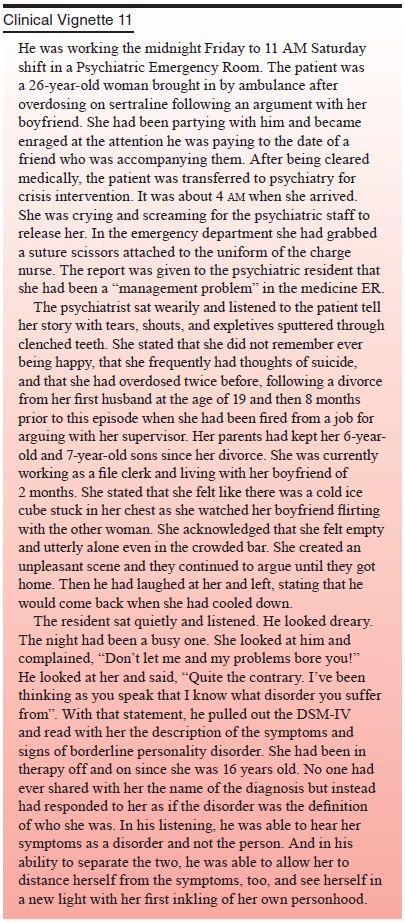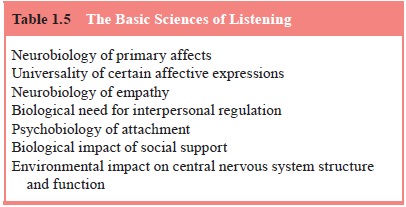Chapter: Essentials of Psychiatry: Listening to the Patient
To Be Found: The Psychological Product of Being Heard
To Be Found:
The Psychological Product of Being Heard
Psychiatric patients may be lonely, isolated,
demoralized, and desperate, regardless of the specific diagnosis. They have lost
themselves and their primary relationships, if they ever had any. Stanley
Jackson (1992) makes the point that before anything else can happen, they must
be found, and feel found. They can only be found within the context of their
own specific histories, cultures, religions, genders, social contexts, and so
on. There is nothing more healing than that experience of being found by
another. The earliest expression of this need is in infancy and we refer to it
as the need for attachment. Referring to middle childhood, Harry Stack Sullivan
spoke of the importance of the pal or buddy. Kohut spoke of the lifelong need
for self-objects. In lay terms, it
is of-ten subsumed under the need for love, security, and acceptance.
Psychiatric patients have lost or never had this experience. How-ever obnoxious
or destructive or desperate their overt behavior, it is the psychiatrist’s job
to seek and find the patient. That is the purpose of listening.
If we look back, wherein the phrase “little fella”
bespoke such deep and important unverbalized meaning, the patient’s reaction to
the memory and recognition by the psychiatrist was dramatic. He had always
known he was dif-ferent in some indefinable ways from his family. That
difference had been both a source of pride and pain to him at various
devel-opmental stages. However, the recognition of the specific source, its
meaning, and its constant presence in his life created a whole new sense of
himself. He had been found by his psychiatrist, who echoed the discovery, and
he had found an entire piece of himself that he had enacted for years, yet
which had been disconnected from any integrated sense of himself.
Sometimes objectifying and defining the
disease/disorder enables the person to feel found. One of the most challenging
patients to hear and experience is the acting out, self-destructive, demanding
person with borderline personality disorder. Even as the prior sentence
conveys, psychiatrists often experience the di-agnosis as who the patient is
rather than what she suffers. The following case conveys how one third year
resident was able to hear such a patient, and in his listening to her introduce
the idea that the symptoms were not her but her disorder.
Gender can play a significant role in the
experience of feel-ing found. Some individuals feel that it is easier to
connect with a person of the same sex; others, with someone of the opposite
sex. Psychiatrists vary in their sensitivity to the different sexes. Some may
do better with those who have cho-sen more traditional roles; others may be
more sensitive to those who have adopted more modern roles.

We now know that just as there is a neurobiological
basis for empathy and countertransference, there is a similar biologi-cal basis
for the power of listening to heal, to lift psychological burdens, to
remoralize and to provide emotional regulation to patients who feel out of
control in their rage, despair, terror, or other feelings (Table 1.5).
Attachment and social support are psy-chobiological processes that provide the
necessary physiological regulation to human beings. This has been shown by the
work of Hofer (1996), Cobb (1976), Meaney (2001), Nemeroff (Heim and Nemeroff,
2001), and many others. Additional work of Paul

Ekman (1992) supports the notion of the patient’s
capacity to perceive empathy through the powerful nonverbal, universally
understood communication of facial expressions. His research in basic human
emotions sets forth the idea of their understand-ing across cultures and ages.
It further supports the provocative idea that facial expressions of the
listener may generate auto-nomic and central nervous system changes not only
within the listener but within the one being heard, and vice versa. Indeed, the
evidence is growing that new experiences in clinical interac-tions create
learning and new memories, which are associated with changes in both brain
structure and function (Kandel, 1999; Gabbard, 2000; Mohl, 1987; Liggan and
Kay, 1999). When we listen in this way, we are intervening not only in a
psychological manner to connect, heal, and share burdens but also in a
neuro-biological fashion to regulate, modulate and restore functioning. When
patients feel found, they are responding to this psychobio-logical process.
Related Topics